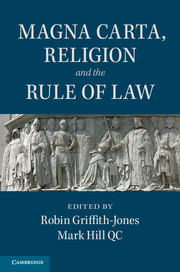Book contents
- Frontmatter
- Contents
- List of contributors
- Preface and acknowledgments
- I Introduction
- II The birth of Magna Carta and the spread of its principles
- 3 Due process in Magna Carta: its sources in English law, canon law and Stephen Langton
- 4 From Charter to common law: the rights and liberties of the pre-Reformation Church
- 5 Magna Carta and the law of nations
- 6 Magna Carta and personal liberty
- 7 Towards a new Magna Carta for early modern England
- 8 Differences over the foundation of law in seventeenth- and eighteenth-century America
- III Comparative religious approaches to Magna Carta's rule of law
- IV The contemporary inheritance of Magna Carta
- Appendix The Charters in translation
- Bibliography
- Index
8 - Differences over the foundation of law in seventeenth- and eighteenth-century America
from II - The birth of Magna Carta and the spread of its principles
Published online by Cambridge University Press: 05 May 2015
- Frontmatter
- Contents
- List of contributors
- Preface and acknowledgments
- I Introduction
- II The birth of Magna Carta and the spread of its principles
- 3 Due process in Magna Carta: its sources in English law, canon law and Stephen Langton
- 4 From Charter to common law: the rights and liberties of the pre-Reformation Church
- 5 Magna Carta and the law of nations
- 6 Magna Carta and personal liberty
- 7 Towards a new Magna Carta for early modern England
- 8 Differences over the foundation of law in seventeenth- and eighteenth-century America
- III Comparative religious approaches to Magna Carta's rule of law
- IV The contemporary inheritance of Magna Carta
- Appendix The Charters in translation
- Bibliography
- Index
Summary
Determining the role of Magna Carta in relation to ideas about religion and the rule of law in the colonial and revolutionary periods of American history turns out to be a complicated task. To begin with, we must cope with the fact that one American historian has identified as many as six different theories regarding the origins and foundations of the American Republic, without ever mentioning Magna Carta or the English legal tradition. The range of theories encompasses the economic determinism of Charles Beard, advanced in the 1920s; liberal ideals associated with the natural rights philosophy of John Locke, and its close relative, civic republicanism, taken up by Bernard Bailyn in his influential book, The Ideological Origins of the American Revolution; Scottish Common Sense philosophy, as discussed by Gary Wills; and a more pluralistic ‘multiple traditions’ approach, as well as a theory about the importance of forgotten and oppressed groups such as slaves, native Americans and women. The influence of these groups is held to be significant in a negative sense, since in drafting the constitution the founders actively contrived to diminish their protection.
As a matter of fact, Bailyn does assess the impact of common law, and its legendary advocate, Sir Edward Coke, on the colonial and revolutionary periods, but concludes that the legal and constitutional tradition was not the primary source of the central issues as they were perceived at the time. Probably more important, Bailyn implies, was ‘a major source of ideas and attitudes of the Revolutionary generation [that] stemmed ultimately from the political and social theories of New England Puritanism, and particularly the ideas associated with covenant theology’.
Jack P Greene, known as ‘the dean of constitutional historians of the eighteenth-century British empire’, has sharply challenged Bailyn's ‘ideological’ approach and, indirectly, the other approaches cited above, in a series of studies culminating in his recent book, The Constitutional Origins of the American Revolution. Drawing on the work of John Phillip Reid, Greene specifically criticises Bailyn for ignoring the significance of ‘the early modern English jurisprudential tradition’.
- Type
- Chapter
- Information
- Magna Carta, Religion and the Rule of Law , pp. 136 - 154Publisher: Cambridge University PressPrint publication year: 2015
- 1
- Cited by



